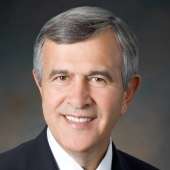Don't defy the Founding Fathers
Don't Defy the Founding Fathers
Senator Mike Johanns
October 26, 2009
Dear Nebraskans,
Each day I spend in the U.S. Senate representing you, I become more in awe of our Founding Fathers' remarkable system of government checks and balances. The difference between the House of Representatives and the Senate is a perfect example. The House was created to be a majority body. If there is a solid majority by either party, as the Democrat Party holds today, that party will almost never lose a vote.
Our Founders, though, wanted something different with the Senate. First, it is the great equalizer. Each state gets two Senators no matter how large or small its population. Secondly, our Founders wanted the Senate to be a check on legislative power.
At the start of our nation's history, there was really no way to end debate in the Senate, except by unanimous agreement. The minority, and even one Senator, had extraordinary power to extend debate. Just within the last 40 years, the Senate agreed that debate could be limited with 60 votes -- a super majority. This is an important check on the federal government's power to impose its will on the American people.
The practical application today is obvious. Voting on something as significant as health care reform, which impacts 16 percent of our economy and every citizen, actually involves two critical stages. The first, a vote on cloture, essentially asks whether the legislation deserves to move to a final vote or remain on the drawing board. If 60 Senators vote for cloture, debate and amendments on the legislation are restricted and a simple majority can pass it.
Some will try to argue the cloture hurdle is an unimportant procedural vote. In reality, it is often the most important vote because it has the higher threshold and clears the way for ultimate passage. Once a Senator votes "yes" on cloture, it is even possible to vote "no" on final passage of the same bill. In fact, nine or more Senators can change their votes between cloture and final passage, yet the bill will still become law because final passage requires only a simple majority. These Senators can then claim they opposed the legislation (referring to their final vote), when actually they enabled its passage (through their cloture vote). This is how senators can be for a piece of legislation before they are against it.
The sixty vote hurdle sometimes looks like an obstruction. It is not. It is a very critical piece of our great system of checks and balances. Had our Founders wanted two legislative bodies both governed by a simple majority vote, they could have created such a system. Thankfully, they created our U.S. Senate to ensure critical issues for our nation would only pass with careful deliberation. Many times in our history, legislation that was not in the best interest of our nation has had majority support in the Senate, but did not become law because 60 votes could not be mustered. The Founders were right to include such an important safeguard.
Sincerely,

